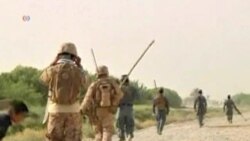Members of Afghanistan's grand assembly or Loya Jirga have criticized President Hamid Karzai's proposal to postpone the signing of a new bilateral security agreement with the United States.
President Karzai says the deal allowing a continued presence of some U.S. troops in Afghanistan after 2014 should be signed after the Afghan presidential election set for April.
U.S. officials reject such a delay, saying they would not be able to form long-term plans on a troop presence without an agreement in place by the end of this year. U.S.-led international combat forces currently in Afghanistan are set to withdraw by the end of next year.
In a direct rebuke to Hamid Karzai, the head of a 2,500-strong gathering of tribal and community leaders on Saturday said if the assembly approves the so-called Bilateral Security Agreement with the United States, the deal should be signed right away.
Assembly leader Sibghatullah Mojaddedi said Saturday that Karzai has no right to postpone the signing and that a delay would not be in Afghanistan's interest.
"Mr. Karzai does not have the right to make such a comment," he said via translator. "The president is wrong because all of his demands and wishes — all the things that we wanted — were accepted and implemented by the Americans."
Earlier, Karzai had said he would abide by the Jirga’s decisions. Washington has been negotiating with Kabul for more than a year on the details of the security deal.
The dispute has overshadowed the four-day meeting of some 2,500 tribal, community and elected leaders, who must approve the text of the Bilateral Security Agreement, or BSA, before it goes before the Afghan parliament.
The draft agreement spells out terms under which international forces will remain in Afghanistan to assist the government in its war against Taliban insurgents.
The majority of Afghan tribal leaders appear to support the agreement, which would take effect January 1, 2015, and keep U.S. troops and civilian personnel in Afghanistan for at least another decade.
President Karzai said he would explain his reason for wanting to delay the signing of the agreement in his closing speech to the Loya Jirga on Sunday.
A draft text of the new agreement says U.S. troops will only enter Afghan homes in exceptional cases — a point of contention in nearly a year of negotiations on the pact.
Analyst Idriss Rahmani, of AIR Consulting, says Karzai is partly trying to gain more concessions, and partly trying to humiliate President Barack Obama and the Democratic Party.
“They gave President Karzai a really hard time since 2004, I guess," Rahmani said. "Being an Afghan and being an Afghan tribal chief, he would feel very much happy if he can get a chance to take a little bit of revenge.”
Correspondent Sharon Behn contributed to this report from Kabul.
President Karzai says the deal allowing a continued presence of some U.S. troops in Afghanistan after 2014 should be signed after the Afghan presidential election set for April.
U.S. officials reject such a delay, saying they would not be able to form long-term plans on a troop presence without an agreement in place by the end of this year. U.S.-led international combat forces currently in Afghanistan are set to withdraw by the end of next year.
In a direct rebuke to Hamid Karzai, the head of a 2,500-strong gathering of tribal and community leaders on Saturday said if the assembly approves the so-called Bilateral Security Agreement with the United States, the deal should be signed right away.
Assembly leader Sibghatullah Mojaddedi said Saturday that Karzai has no right to postpone the signing and that a delay would not be in Afghanistan's interest.
"Mr. Karzai does not have the right to make such a comment," he said via translator. "The president is wrong because all of his demands and wishes — all the things that we wanted — were accepted and implemented by the Americans."
Earlier, Karzai had said he would abide by the Jirga’s decisions. Washington has been negotiating with Kabul for more than a year on the details of the security deal.
The dispute has overshadowed the four-day meeting of some 2,500 tribal, community and elected leaders, who must approve the text of the Bilateral Security Agreement, or BSA, before it goes before the Afghan parliament.
The draft agreement spells out terms under which international forces will remain in Afghanistan to assist the government in its war against Taliban insurgents.
The majority of Afghan tribal leaders appear to support the agreement, which would take effect January 1, 2015, and keep U.S. troops and civilian personnel in Afghanistan for at least another decade.
President Karzai said he would explain his reason for wanting to delay the signing of the agreement in his closing speech to the Loya Jirga on Sunday.
A draft text of the new agreement says U.S. troops will only enter Afghan homes in exceptional cases — a point of contention in nearly a year of negotiations on the pact.
Analyst Idriss Rahmani, of AIR Consulting, says Karzai is partly trying to gain more concessions, and partly trying to humiliate President Barack Obama and the Democratic Party.
“They gave President Karzai a really hard time since 2004, I guess," Rahmani said. "Being an Afghan and being an Afghan tribal chief, he would feel very much happy if he can get a chance to take a little bit of revenge.”
Correspondent Sharon Behn contributed to this report from Kabul.






